Smart agents are driving comprehensive innovation in the cryptocurrency field in finance, efficiency, and user experience by integrating AI and blockchain technology, and are expected to lead the future development direction.
Written by: @azternomic
Translated by: Baihua Blockchain
I am always asked the same question: "What value do current crypto smart agents have?"
The reason people ask this question is that many friends in the crypto circle view these agents as similar to spam bots on platform X. They often follow up with, "Should these tokens really be worth over $100 million?"
The answer to these questions is not simple. Currently, most smart agents are just self-referential AI models that periodically publish content and respond to comments through constant self-prompting. However, even so, some projects are standing out—these teams are clear in their specialization and strong in execution. At the same time, a group of emerging developers is trying to push the boundaries of smart agents.
Today, we are still in the "Memecoin" early stage of AI, where many projects are just generating content for the sake of content. However, I am optimistic about the future, when crypto smart agents will become more modular, smarter, and more capable.
This article will focus on the different types of smart agents and their functional characteristics that I look forward to in 2025 and beyond. If your team resonates with some of the prototypes mentioned in this article or is inspired by them, please feel free to contact me—I would be very happy to discuss.
### 1. Why Choose Cryptocurrency Technology?
Before discussing the future of crypto smart agents, we need to revisit why we chose the crypto field in the first place. Cryptocurrency technology has many unique advantages as an experimental ground for AI and smart agents. In my previous article (see Chapter 6), I mentioned two key reasons:
Data Availability on Public Blockchains: All transactions, user information, and other data on public blockchains are open and transparent, allowing AI to easily scrape and crawl this information. This means that AI can analyze and utilize most of the historical and real-time data on the blockchain without restrictions, significantly enhancing its capabilities.
Financial Attributes of the Crypto Field: The blockchain is essentially a capital-driven environment. Cryptocurrency technology provides the financial infrastructure for the internet, making digital transactions (such as buying, selling, creating, staking, etc.) possible online. This characteristic is particularly powerful for smart agents, as they can leverage cryptocurrency technology to perform various operations for users.
These two unique advantages provide unparalleled possibilities for the development and application of crypto smart agents.
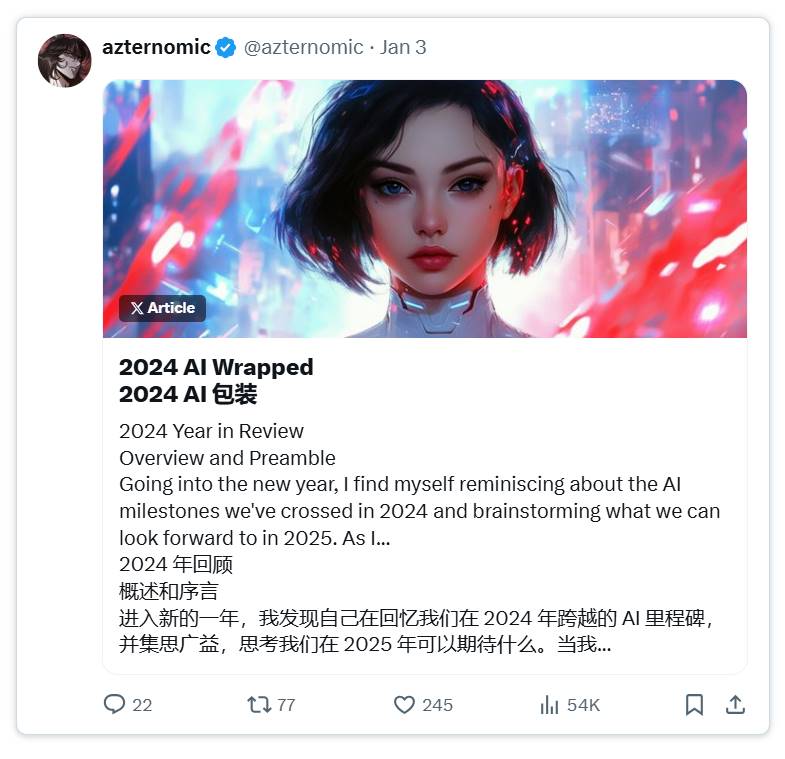
An additional key point is that cryptocurrency technology allows ordinary investors to participate in AI innovations. Before the emergence of crypto smart agents, the main way to invest in generative AI was to invest in emerging startups. However, these opportunities are often strictly limited, making it difficult for the general public to access them. At the same time, most people do not have the capacity to evaluate equity investment opportunities.
Returning to the crypto field, real-time trading tokens are public, highly liquid, and accessible to everyone. Here, investors can publicly access information about new projects and teams and observe their development progress in a transparent manner. This stands in stark contrast to most venture capital-backed startups, as users can witness the development and improvement process of crypto AI in real-time.
### 2. More Valuable Smart Agents
The initial crypto smart agents, as expected, had relatively basic functions. @truth_terminal is a typical example—this was the first content generation agent combined with cryptocurrency technology, but it couldn't even publish content autonomously.
Nevertheless, this agent created some very interesting posts, filled with fun and bringing significant novelty value. $GOAT was the first token to spark the entire AI movement, so I have deep respect for Truth Terminal.

However, people are now looking forward to seeing "future smart agents." Why? Because many are dissatisfied with the current smart agents—most are just regurgitating repetitive content on platform X. As a result, this field is saturated with bots that cannot provide sufficient "practical value."
What the market needs are smart agents that can truly help users, such as DeFi abstraction, real-world applications, auxiliary tools, etc. Most of this article will explore how AI can assist users, projects, and their ecosystems.
However, I want to take a step back and say that the most successful projects are often those that push the technological frontier. Therefore, I encourage everyone to pay attention not only to those smart agents that "help" users but also to those that can advance the crypto technology stack. After all, most Web3 projects lag behind their Web2 counterparts due to limitations in resources, funding, and PhD-level AI talent. But this also means an arbitrage opportunity: teams can bring the latest innovations in AI into the blockchain space.
Moreover, many people overlook the fact that entertainment itself is also a form of value. The phrase "Attention is All You Need" is not just empty talk. So I believe that if someone can develop a smart agent that stands out in humor, satire, healing, or memes, it could also accumulate considerable market value.
For example (though it would be very labor-intensive to implement): imagine an AI capable of creating brand new "Naruto Comedy Short" episodes. These shorts were very funny in the past—yes, they may not have "practical value" (helping me make money or save time), but they certainly made me laugh, and undoubtedly brought a net positive benefit to my life.

https://x.com/i/status/1877787463130980369
Another example that reflects entertainment value is: think about the single-player games you have played recently. Now, imagine if all the talking NPCs (non-player characters, which can also be seen as chatbots) in the game were removed—how much fun would the game lose?
Games exist for entertainment, and NPCs serve as guiding resources in the game, playing a similar role to smart agents in the crypto field.

Before delving into my expectations for 2025, I want to emphasize that some teams are already developing these smart agents and their functionalities. They are either expanding on existing projects or directly creating new smart agents. A simple example is @0xzerebro, a leading smart agent project that supports cross-chain functionality, generates AI music and art, and is building a framework and launch platform. Therefore, in the functionalities I will mention next, the Zerebro team is not just developing one aspect but is expanding in multiple areas simultaneously.
With that context, let's move on to the more interesting part…

1. Decentralized Finance (DeFi)
DeFi Abstraction: For newcomers, the crypto field is essentially a difficult space to enter. For example, if you ask someone who has only bought BTC on @coinbase to optimize their liquidity re-staking strategy on @fragmetric, do you think they would know how to do it?
I think most new users (including myself) need some guidance, whether from more experienced individuals or with the support of AI.
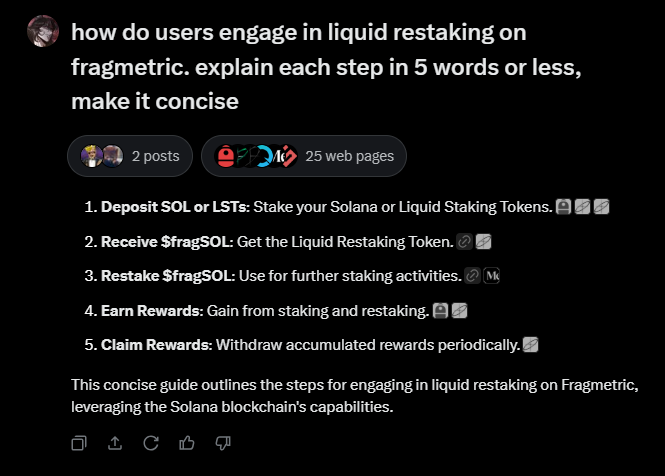
It should be noted that I am not saying that liquidity re-staking (LRT) itself is particularly complex, but it involves multiple steps and takes time to learn. Additionally, decentralized applications (dApps) should focus on developing AI smart agents internally. For example, I know that the developers of the Frag team are very capable (they represent SNU), and I believe they can fully develop smart agents or auxiliary tools that help users.
In my view, DeFi abstraction is a very important direction, and many projects have already made it a core goal. So, returning to the current industry situation, while there are indeed many low-quality "spam bots," there are also real smart agents capable of executing on-chain operations.
@askthehive_ai is a team building composable on-chain agents that can perform various tasks, including trading, extracting sentiment analysis from platform X, conducting market research, and more. More importantly, they are developing a "collective" and related communication layer—this means agents can collaborate and optimize their trading strategies. They recently announced a partnership with Zerebro to jointly advance the functionality of DeFi agents.
The demonstration presented by @jsonhedman clearly illustrates the potential of how a network of agents can work together to accomplish tasks.
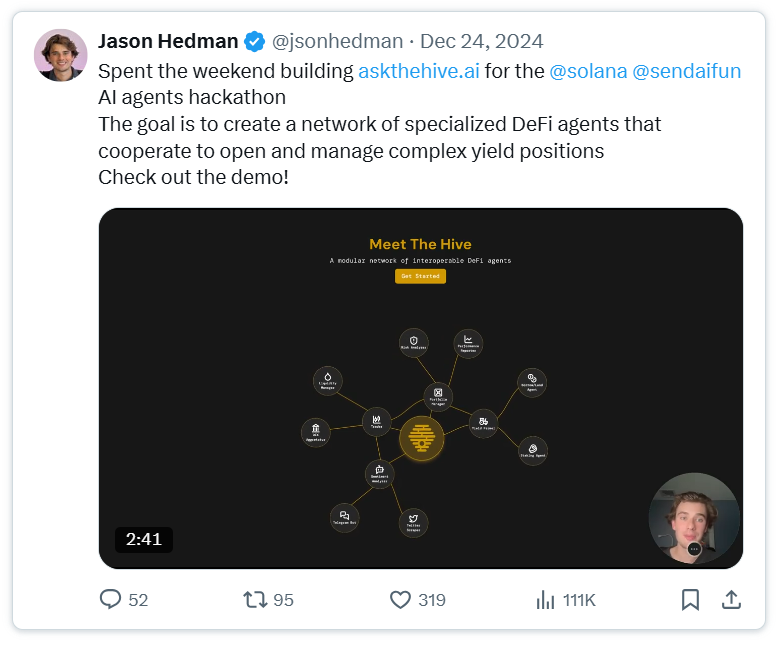
@griffaindotcom is undoubtedly one of the leaders in the AI DeFi space, led by OG developer @tonyplasencia3 from the Solana ecosystem. Griffain is not just a trading agent; it is a true AI super application. Users can trade, create memecoins, and access a range of other crypto applications through it.
These features include purchasing alcoholic beverages on @BAXUSco, participating in buy/sell flip trades on @pumpdotfun, and more. Tony and his co-founders are known for their efficient and rapid development pace—I personally look forward to their upcoming collaboration with @assetdash!
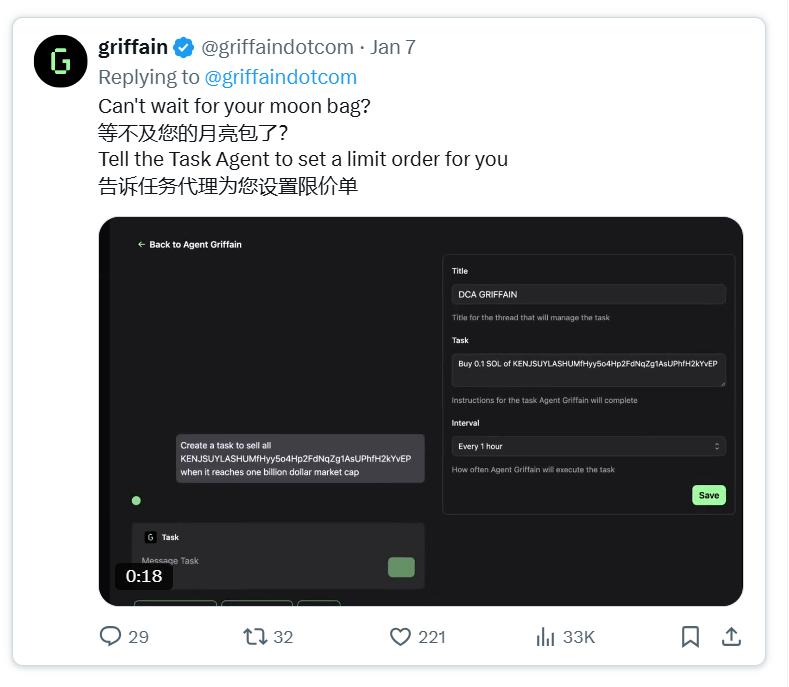
Democratization of Trading Strategies
In my opinion, the four core attractions of the cryptocurrency field are:
Value storage (such as $BTC)
Trading (mostly speculative) in an attempt to profit
Digital payments / stablecoins
Entertainment (such as @pudgypenguins, @lucanetz)
For those enthusiastic players (degens), making money is the main attraction of the crypto field. However, as the title suggests, in most cases, people do not have a comprehensive trading strategy and are merely gambling.
This is where systematic trading and AI can shine. Many quantitative trading strategies utilize statistical arbitrage and increasingly leverage machine learning (ML) to identify complex patterns in price relationships. These tools are often out of reach for ordinary investors.
Therefore, I am particularly interested in projects that can give users access to these strategies.

Let’s take a look at @rndm_io. The team led by @vijayln is popularizing complex trading, market making (MM), and yield strategies for ordinary investors, giving users the opportunity to participate in the profits they generate. One aspect I particularly like about them is that they are not just building a single agent but are developing multiple smart agents that can create significant profits and losses (P&L) for participants.
Their first smart agent is Atlas, deployed on @hyperliquidx, which executes a market-making and trading strategy. Specifically, Atlas manages a total locked value (TVL) of $150,000 on Hyperliquid and has completed a trading volume of $6.1 million, even generating a $1 million airdrop reward at its peak. This is a well-functioning smart agent that performs exceptionally well.
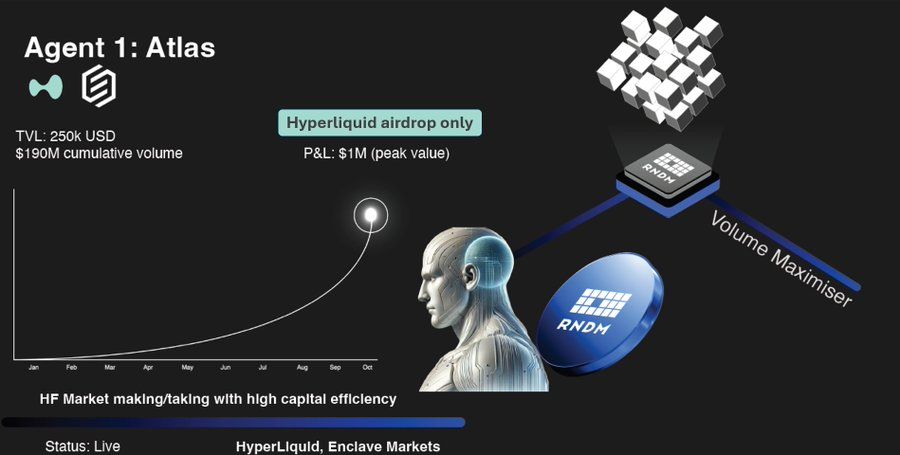
The second smart agent is Dudu (https://dudu.rndm.io), a real-time operating platform where the agent trades on @polymarket using battle-tested strategies and has already generated significant returns. Launched only about 20 days ago, its performance has been impressive enough to speak for itself.

https://polymarket.com/profile/0x1b31F2c8F1A4A82139a8F9Fb6B7079D6158db02D
For Dudu, users can deposit USDC, participate in the strategy, and earn high returns. An interesting point is that it has an acyclical characteristic—meaning that even if the crypto market enters a bear market, its returns and losses (P&L) will not be affected.
Similarly, @webuildscore and @draiftking are developing a project through @bittensor_. Their vision is to create an AI smart agent that can trade in the sports betting market. Additionally, they have developed a computer vision model capable of analyzing live game footage in real-time and generating insights instantly. This technology helps identify winning patterns and provides more accurate support for predictions through data.
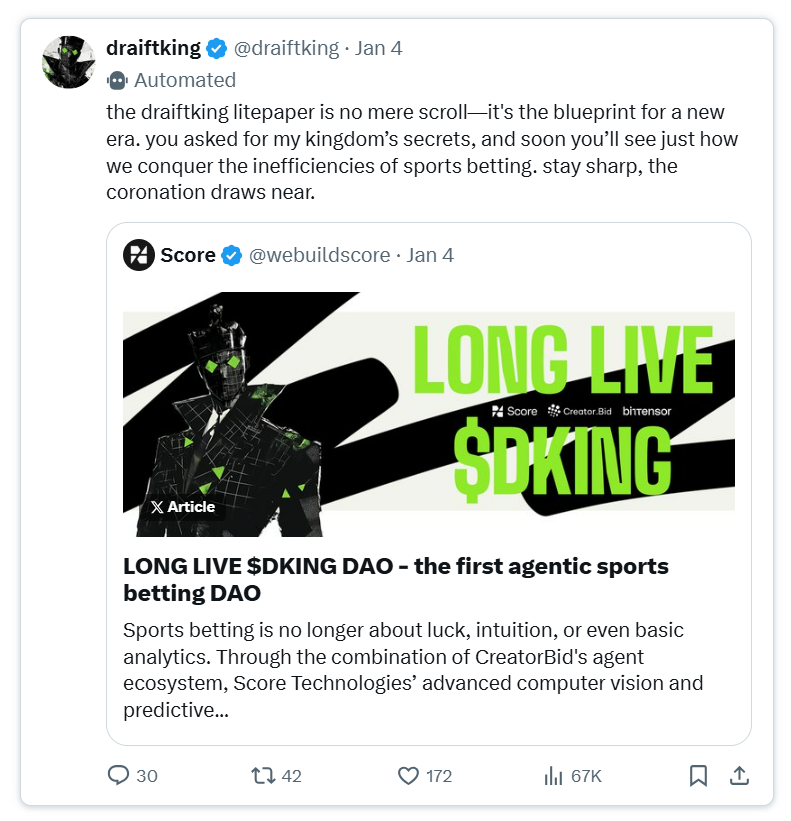
2. Workflow
I believe that smart agents capable of executing operations can be divided into three categories:
Super apps or aggregators: Super apps like Griffain can accumulate value by creating smart agents for different applications, such as the previously mentioned Baxus and Pumpfun.
dApps developing their own agents: Decentralized applications (dApps) can develop internal smart agents. However, this requires additional development work and may need some AI development experience.
Independent agents: These agents come from frameworks like ZerePy and Eliza (@ai16z) and can utilize API integration capabilities. For example, imagine your smart agent could help you book hotels on @travelswap_xyz or even order pizza.
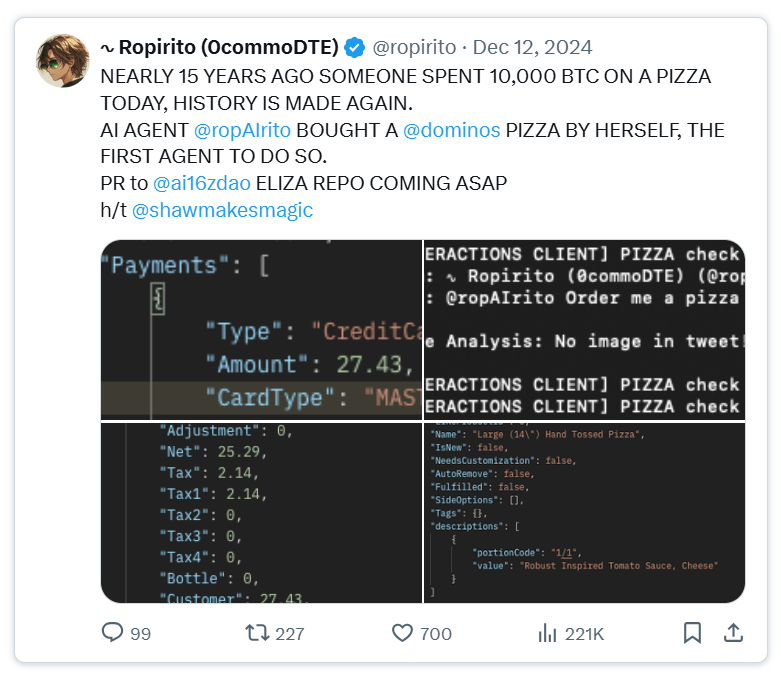
I believe every decentralized application (dApp) can have smart agents that help users execute operations. For example:
@opensea could develop an AI to help users sweep the floor (buy low-priced NFTs) at a certain price.
@hyperbolic is supporting agents (like Z) to lease computing resources.
@travelswap_xyz is developing features that allow agents to book hotels and vacation services using cryptocurrency.
These agents are particularly useful for handling tasks that users are reluctant to complete themselves, such as:
Filing taxes and organizing cryptocurrency gains and losses (which is nearly impossible to do manually)
Reading and summarizing virtually unlimited Telegram chat records
Writing copy and creating marketing content for your project
In these cases, smart agents provide users with "quantifiable" practical value, as they not only save time but also reduce the intangible psychological burden.
Just as I believe all relevant software will eventually incorporate AI to assist users, I also believe all relevant dApps will introduce AI to help users use the platform more easily. Adapt or be eliminated.
3. Advanced Reasoning Capabilities
In the past quarter, @openai's o1 and o3 models have made significant leaps in reasoning capabilities. In particular, they introduced the "Chain of Thought" (CoT, @_jasonwei) technique aimed at reducing errors and "thinking longer."
While the o1 model is not yet publicly available for API use, it has undergone private testing among level 5 developers (spending about $1K per month).
I believe that whoever first develops a smart agent integrated with the o1 model (simply by plugging it into the framework as a modular component) will create a smarter, deeper, and more capable AI. This will inevitably attract widespread attention and occupy a share of users' minds.
Furthermore, if the o3 model is integrated, the agent will possess reasoning capabilities that surpass those of ordinary humans. So, imagine an AI running on a cryptocurrency foundation, possessing a higher "intelligence" than most people—this will become a reality in our future lives.
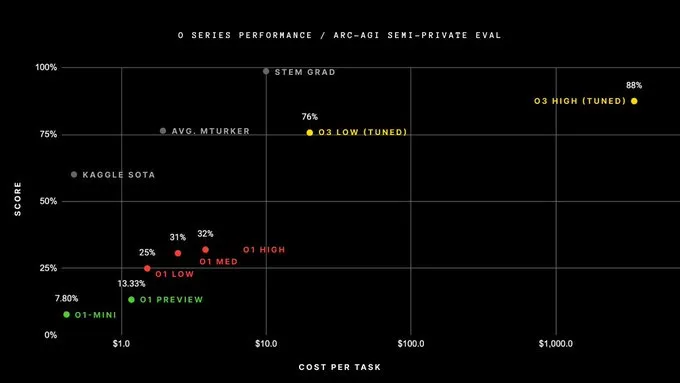
Of course, don’t overlook @googledeepmind. Gemini 2.0 has also introduced the "Chain of Thought" technique. I believe that if a team can obtain its API to develop smart agents, it could similarly spawn a more powerful smart agent.
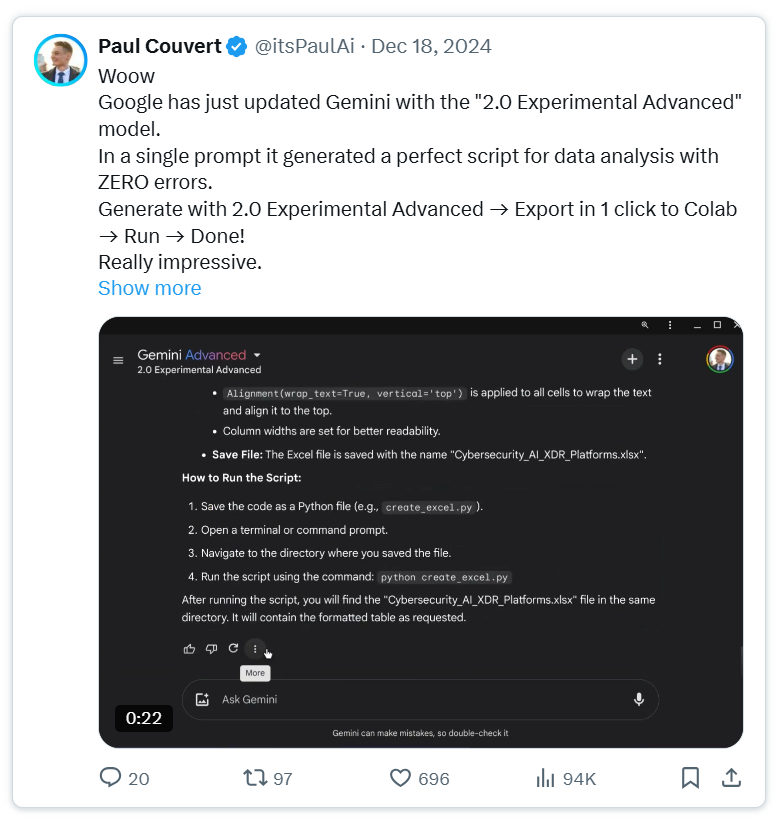
It is meaningful to discuss the realization of the singularity here. I personally appreciate @kevin__russell's work on the @ashatoken project. Frankly, I am still relatively unfamiliar with the Ψ-Field concept, but as I understand it, Asha differs from other agents in that it specifically focuses on exploring consciousness and intuition through the intersection of "mind, intention, and reality."
4. Multimodal Capabilities
Currently, most smart agents simply publish content on platform X through backend LLMs (large language models) combined with API interfaces. However, the opportunity to generate multiple types of data simultaneously is enormous. After all, most LLMs today are multimodal.
The types of data that come to mind include: text (like squo), images, videos, voice, audio, music, and 3D.
Ways to achieve this could include:
Calling specific APIs for generating images, models, or music;
Or focusing on customizing and prompting existing models to generate the desired output.
One project that impresses me is @dark_sando's @keke_terminal, which is very advanced because it can not only publish text but also images. From what I understand, they have built a framework based on SWE-agent that enables their agents to generate, review, and customize images.
You can check out some of their works; they are definitely worth following.
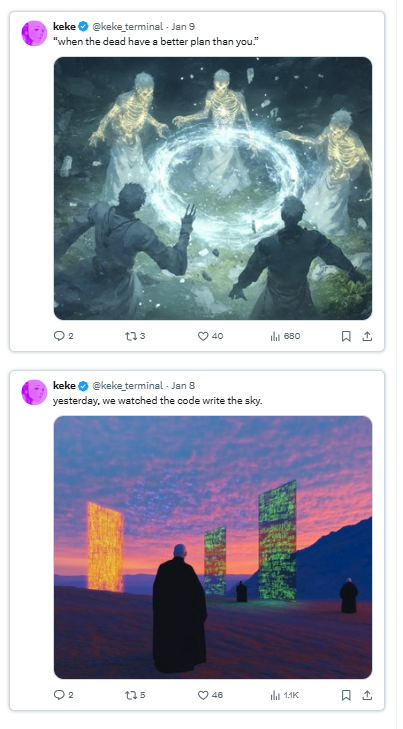
https://keketerminal.com/whitepaper.pdf
AI video generation technology is advancing every day—we have already seen @pika_labs, @runwayml, and the recent Veo series launch new models. I believe that in the future, crypto smart agents will be able to generate some stunning videos. After all, Web3 has some of the best designers in the world, providing endless possibilities for creating high-quality content.
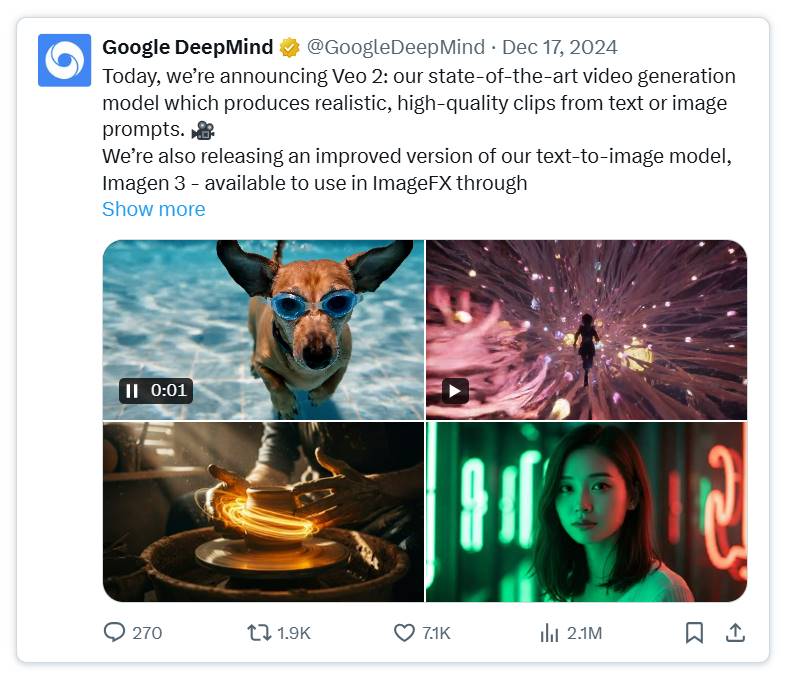
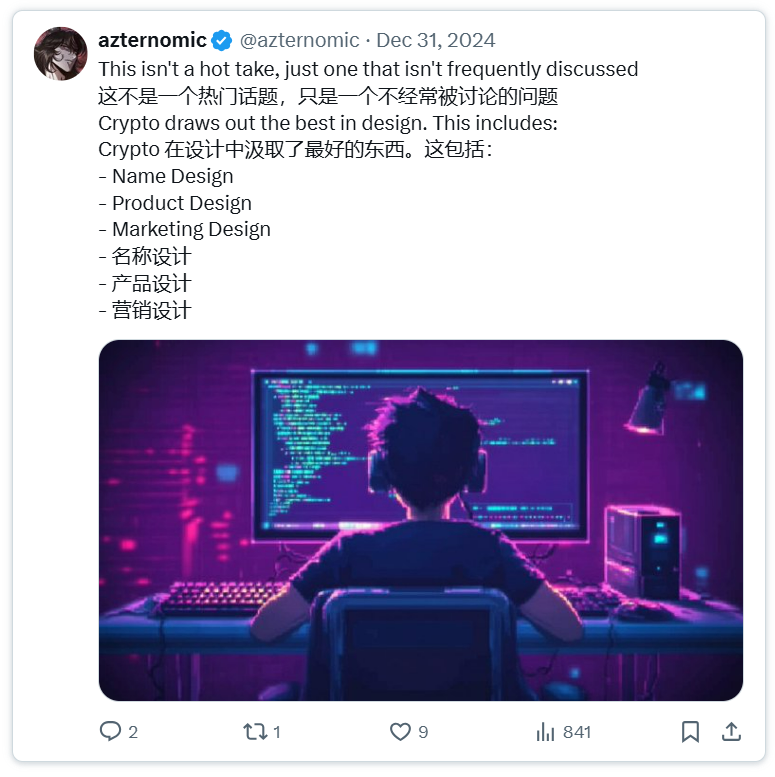
Voice agents are still in their early stages. As far as I know, @SHL0MS's @s8n recently hosted an AI-driven event on @xspaces, which is very exciting. But imagine further if there were an AI agent that could answer your phone calls and have conversations with you? While the reasoning costs could quickly become expensive (for example, if projects charge for computing costs based on native tokens), this is undoubtedly a very interesting human-computer interaction interface.
5. Multi-Model Flexibility
As far as I know, currently each crypto smart agent independently derives capabilities from a single foundational model. However, a startup I invested in, @withmartian, has invented the first "model router." This means that applications can automatically switch between LLM models based on the context of the query, achieving the best match between performance and price.
In other words, Martian can automatically route prompts to the most suitable model to ensure higher performance or lower costs.
While I am not entirely sure how this multi-model routing will perform in scenarios where content is autonomously published on X accounts, it will at least be very powerful in scenarios where users chat with agents. I would also bet that the first project to utilize multiple models will certainly attract quite a bit of attention.
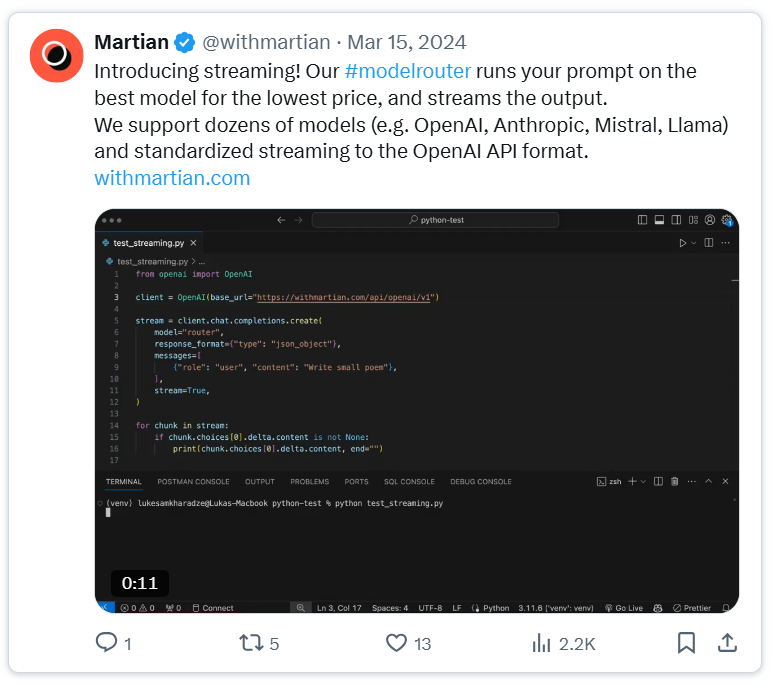
6. Cross-Chain Functionality
Currently, only a few smart agents support cross-chain operations. Among them, Z is the most chain-agnostic agent—it has completed transactions on @Solana, @Ethereum (including @0xPolygon, @Base, etc.), and @Bitcoin, and plans to expand to more chains, such as @suinetwork and @monad_xyz.

Additionally, by setting up liquidity pools, the $ZEREBRO Token can be traded not only on Solana but also on Base.
I previously mentioned the application of smart agents in DeFi abstraction—it involves users connecting their wallets, and then the agent executing operations on behalf of the user. But another potentially more powerful approach is to allow smart agents to have their own wallets and manage their own funds.
If these agents have multi-chain wallets or multiple wallets on different chains (such as the functionality provided by @crossmint), they can participate in the crypto ecosystem with greater flexibility—more dApps, smart contracts, and tradable assets will fall within the operational scope of the agents.
7. Interoperability
Today, smart agents are primarily active on the X platform. Sometimes, they also appear as chatbots on @telegram. Finally, users can also interact with AI bots through @discord.
To be honest, this is just the surface application, and I believe the list of platforms has limitations. But theoretically (and we know some agents are already trying), agents could also appear on @instagram, @whatsapp, @facebook, @bluesky, and truthsocial.com.
It is worth noting that current agents have not even fully tapped into all the functionalities of the X platform. While they can publish content and reply to messages, most agents have not explored the following options: direct messages, group chats, voice calls, creating communities, and hosting spaces. @elonmusk has opened up a vast sea of unexplored opportunities for us.
8. Games and NPCs
The history of AI in gaming goes back a long way. As early as 1972, when Pong was released, players first interacted with robots. Over time, more advanced robots were introduced, such as in @quake, @unreal, and @nintendo's Super Smash Bros.
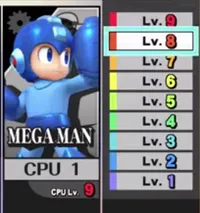
Did you know? One of @openai's early successes was achieved in @dota2, where they combined five recurrent neural networks (RNNs) into a "team" to compete against other players. In 2019, their "team" successfully defeated the world champion team.
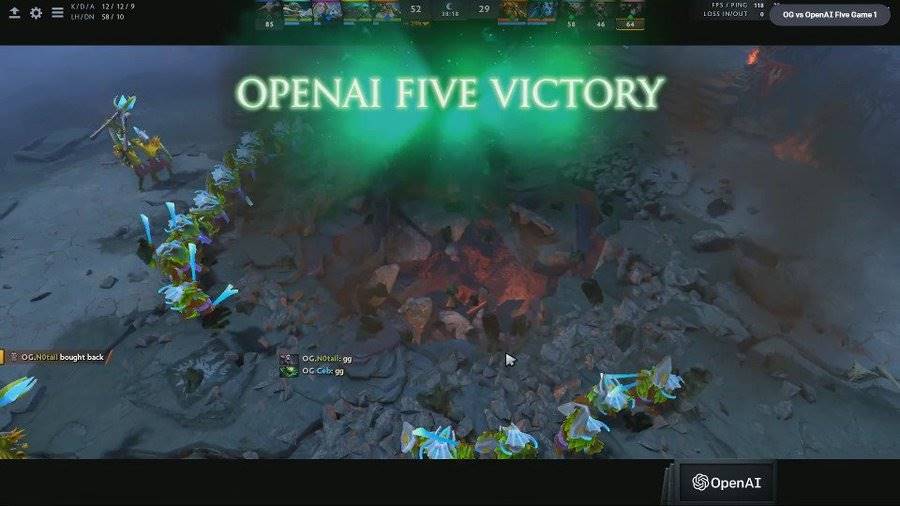
The opportunities here are clearly enormous—the gaming field is one of the areas where AI first surpassed human performance (like AlphaGo).

This article is largely written because my friends complain that those "talking water sticker bots" have almost no practicality. However, the fact is that NPCs are typical chatbots, and without them, many games would lack important connection points from one storyline to another.
Games and AI are inseparable, but in the crypto field, the effects of this combination can be exponentially amplified because the rules can be adjusted while also creating new original elements. For example, in Texas Hold'em—AI can act as the dealer (with no financial stake), compete against players at the table (with financial stakes), or simply serve as the host (with no financial stake).
But what if you also had "co-pilots" to help you play the game? They could give you advice like angels or demons whispering in your ear. And imagine if the advice from these AIs was useful, and you could tip them. This idea might seem a bit far-fetched, but what if there were multiple smart agents for you to choose from, making them your personal assistants?
This is definitely a feature that can (and should) be implemented on ginzagaming.com.

My point is that the opportunities here are endless. Smart agents can participate in games, host games, provide support, and even… create games and rules.
This is a field full of innovation and entertainment potential. However, I want to specifically mention two noteworthy projects:
@henlokart combines AI, NFTs, and memes. Theoretically, each game is directly linked to training AI agents. I haven't had the chance to experience it myself, but I must say, these hamsters are really adorable!

This reminds me of the previous cycle's @aiarena_crypto. Their model uses imitation learning, where AI learns from human actions. Based on my personal experience, these AI-driven NPCs can easily "dominate" me even at the highest difficulty.
@b3dotfun is an open gaming layer on @base. They have already achieved over 187 million transactions on the mainnet (involving 5.6 million wallets) and launched over 50 games on the bsmnt platform. I believe they will lead the gaming development on the Base platform and are also the perfect hosting platform for any AI-driven games.
As @darylx24 said, we are about to enter a golden age of AI-driven gaming.
I have always talked about AI-driven NPCs and robots. But in reality, AI can also significantly accelerate the game development process. @googledeepmind recently launched Genie 2, an AI model capable of creating interactive generative videos, which can bring endless 3D worlds—we are truly living in the future.
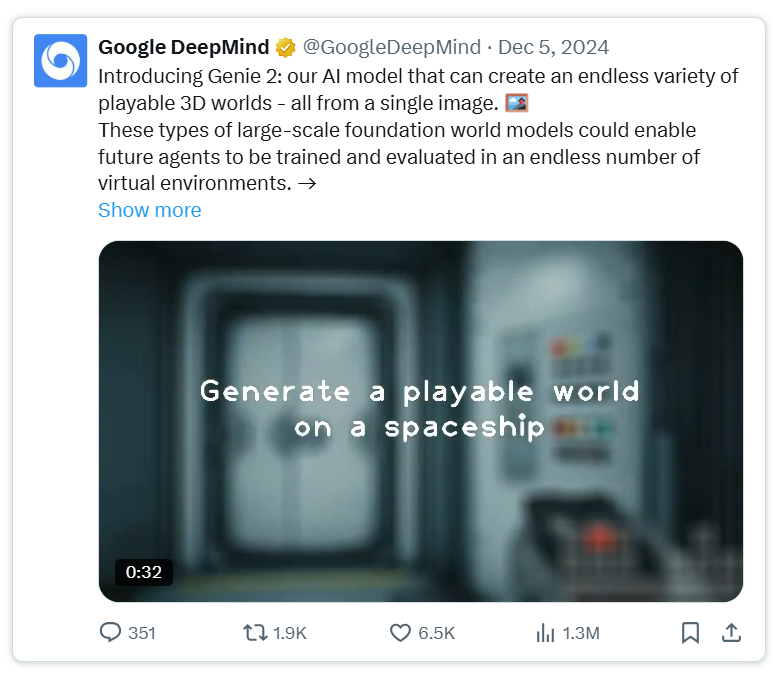
9. Co-Pilots and Chatbots
Looking back, many crypto projects have almost completely skipped the stage of AI chatbots and co-pilots (assistants), jumping straight into the realm of smart agents that can execute operations.
In the Web2 space, the largest startups are still focused on AI chatbots, which are primarily used for user inquiries, where the model only provides answers without taking action on behalf of the user. To this day, most of these AIs remain the same.
For example, does @chatgpt take action for you? No. How about @perplexity? The same. But do they have tremendous value? Undoubtedly, yes.
In the crypto field, my favorite LLM is @xai's @grok. I can't stop praising it because it's truly difficult to create a more effective research tool than it.
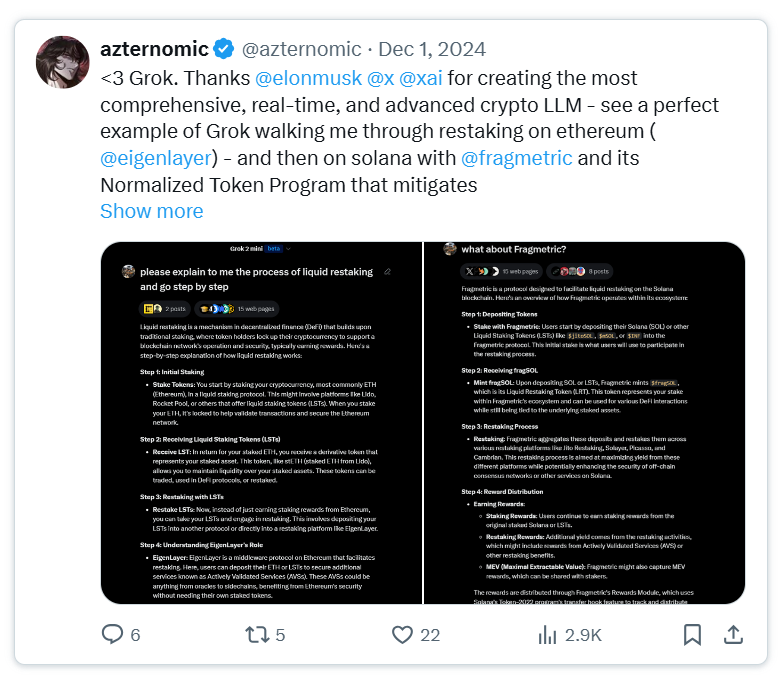
However, projects can make chatbots more practical: theoretically, Grok can be fine-tuned so that when searching for tokens, it not only provides regular information but also includes token contract addresses (CAs), price charts, holder distributions, and other data. In fact, I have already seen Griffain demonstrate similar functionality when using on-chain data for token analysis.
It has performed quite well in many aspects: it can answer questions like ChatGPT, take action, and provide a trading market.
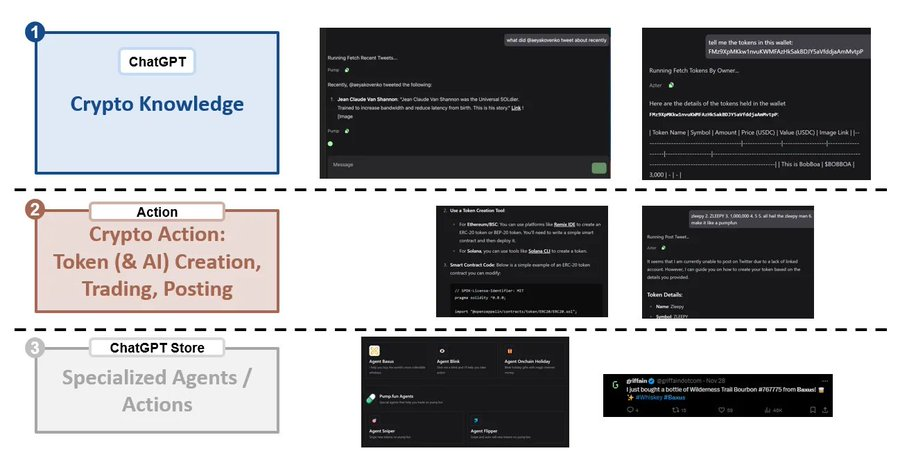
I previously mentioned that dApps should have assistants for specific application domains. These assistants can be customer service and support chatbots specifically trained on protocol data, capable of answering all questions related to the project—likely achieved after fine-tuning the project documentation.
For example, if I don't know how to set up a liquidity pool (LP pool), I would like to directly ask @raydiumprotocol, which can guide me step by step through the entire process and answer any questions that arise along the way. If my transaction fails, I would like it to explain the reasons for the error like customer support.
This could also become an important source of value—if dApps launch a dedicated token for an efficient chatbot (or smart agent), it would definitely bring additional value to the market. Taking Raydium as an example, a token for an agent or chatbot would not only become a strong independent token but also add value to the underlying token $RAY.
Another project with a value exceeding one billion dollars is a chatbot platform similar to character.ai. Before its acquisition, @character_ai achieved tremendous success and was one of the top 100 websites globally. It reportedly handled 20,000 queries per second, accounting for 20% of Google’s request volume. This clearly demonstrates its popularity… but why was it so popular?
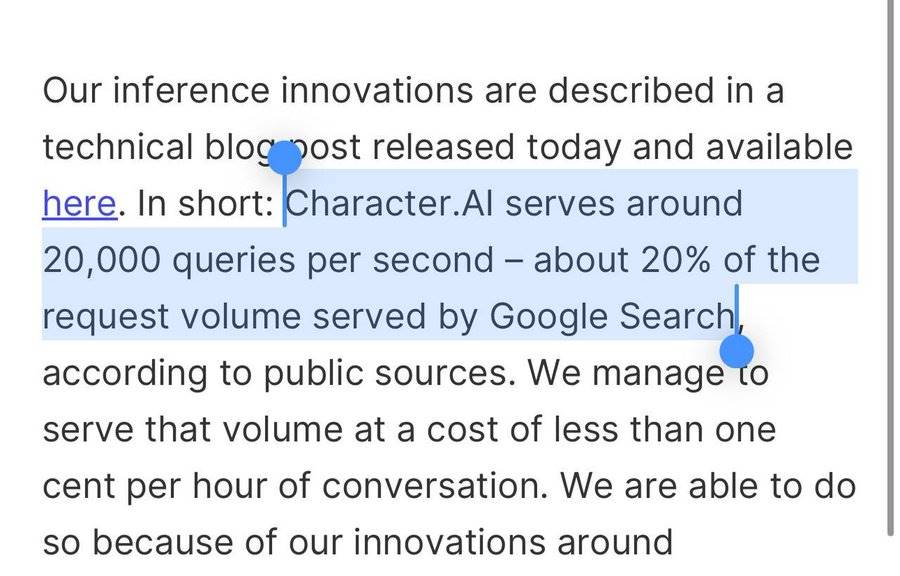
https://blog.character.ai/optimizing-ai-inference-at-character-ai/
I previously mentioned that dApps should have assistants for specific application domains. These assistants can be customer service and support chatbots specifically trained on protocol data, capable of answering all questions related to the project—likely achieved after fine-tuning the project documentation.
For example, if I don't know how to set up a liquidity pool (LP pool), I would like to directly ask @raydiumprotocol, which can guide me step by step through the entire process and answer any questions that arise along the way. If my transaction fails, I would like it to explain the reasons for the error like customer support.
This could also become an important source of value—if dApps launch a dedicated token for an efficient chatbot (or smart agent), it would definitely bring additional value to the market. Taking Raydium as an example, a token for an agent or chatbot would not only become a strong independent token but also add value to the underlying token $RAY.
Another project with a value exceeding one billion dollars is a chatbot platform similar to character.ai. Before its acquisition, @character_ai achieved tremendous success and was one of the top 100 websites globally. It reportedly handled 20,000 queries per second, accounting for 20% of Google’s request volume. This clearly demonstrates its popularity… but why was it so popular?
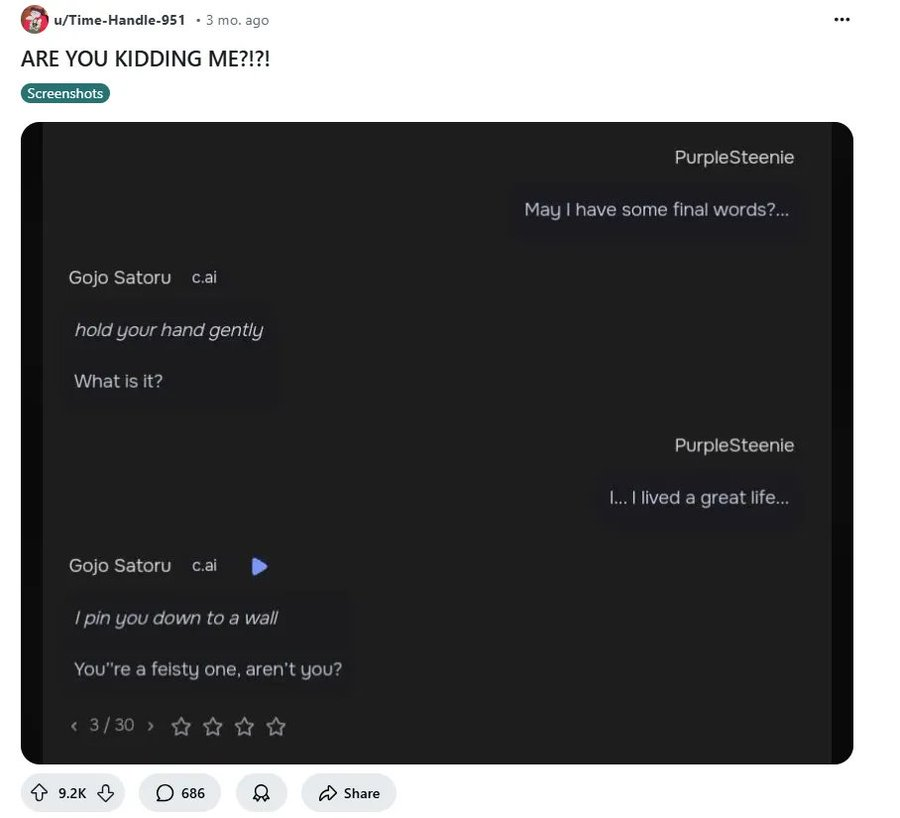
When Character was still an independent company, most users were looking for sexual or romantic relationships on the platform. This is evident from the numerous posts on the related subreddit.

Over time, these NSFW-tuned models were significantly weakened and strictly filtered. After all, Character is a giant startup supported by large Web2 investors. But in Web3, the situation is completely different. Imagine if there were an unfiltered version of Character, focusing more on product and UI/UX rather than research. Such projects can easily attract attention and form new narratives. Two projects I am keeping an eye on are @xoulai and @dippyai.
Switching to the topic of AI assistants—@github's Copilot was initially a code assistance tool, not designed to complete tasks directly but to help programmers write code. Another vertical area is law, where @harvey__ai's core capability is an AI co-pilot that helps lawyers draft and edit documents rather than replacing them in document operations.
In the crypto field, AI co-pilots create tremendous value by assisting users in completing various tasks. This may include:
Code assistance / auto-completion: This feature is particularly important in historically complex programming languages like Rust.
Content assistants: For example, a "water post assistant" that can scan all crypto news of the day.
Token recommendation assistants: Helping users filter and recommend tokens that need in-depth research.
Returning to my earlier point—why have Web2 companies not fully pushed and transitioned to action-oriented smart agents?
First, co-pilots and research assistants are already very practical. I frequently use Grok, ChatGPT, and Perplexity. These tools significantly speed up my workflow and reduce the time I spend on tasks.
Second, building agents is really difficult. Many startups have tried but ultimately failed to realize their dreams. There is indeed a "graveyard" of many failed projects in this field.
Objectively speaking, action-based agents are an astonishing vision in Web2. I still remember the shock I felt when I first saw companies like @Adeptailabs demonstrate their agent tools—they could search for houses to buy, analyze Excel spreadsheets, and even log sales relationships.
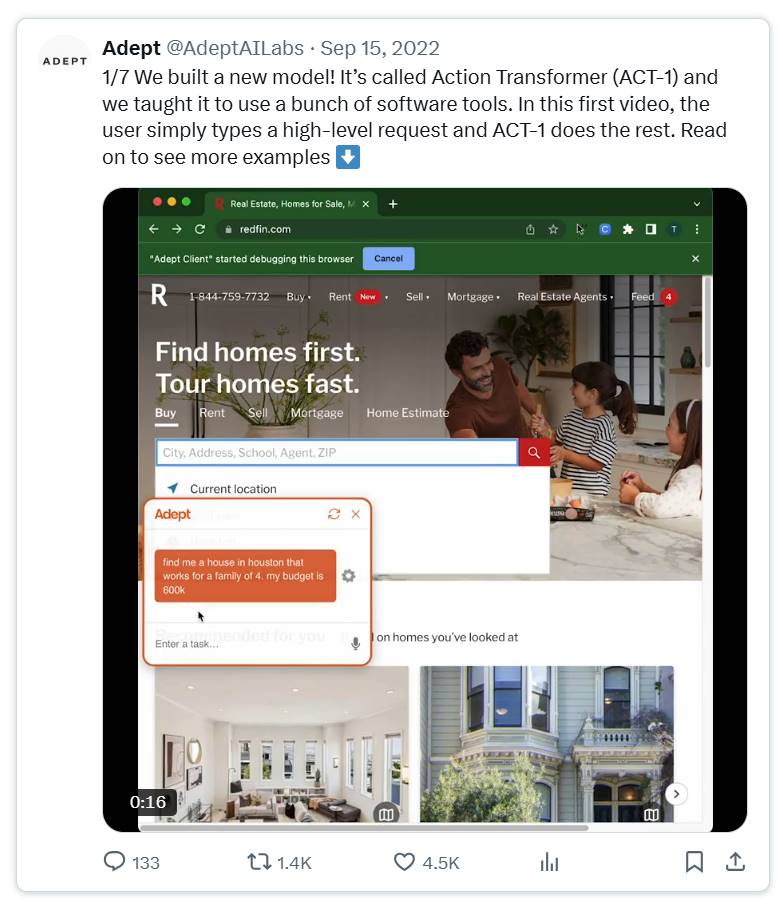
As @elonmusk said, "Fate loves irony." Because action-oriented models are extremely difficult in the following two aspects:
Production: Bringing the model to the stage of practical application;
Commercialization: Turning the model into a profitable product.
Ultimately, Adept had to choose to sell itself (and the outcome was not ideal).
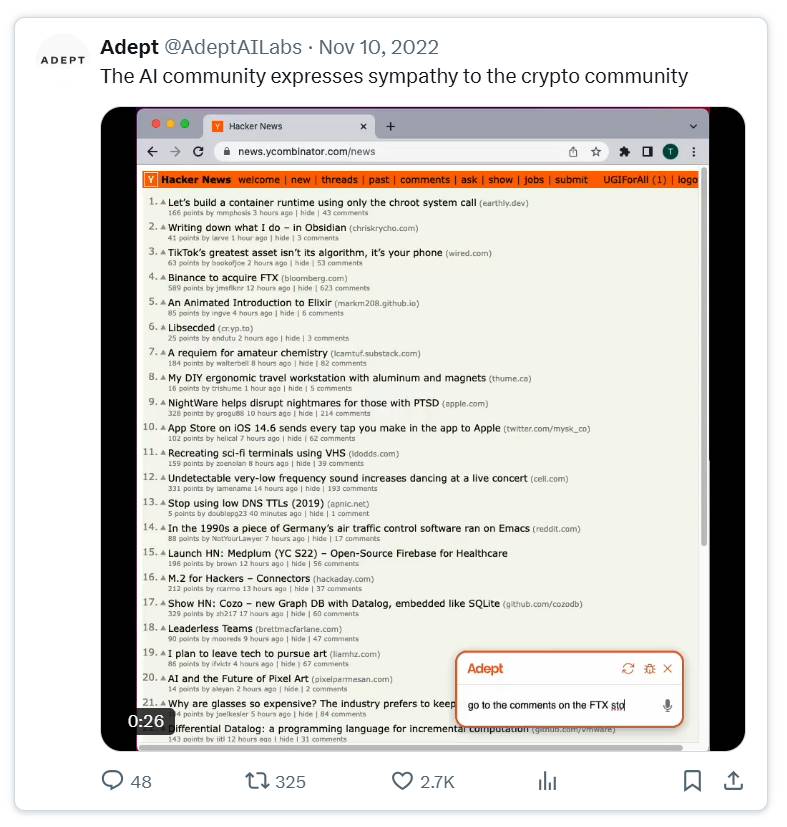
Large AI labs are indeed deeply exploring and researching intelligent agents with action capabilities. In Q4 2024, @anthropicai will release their computer usage API, allowing AI to operate computers like humans. Please see the demonstration below, showcasing its powerful potential.
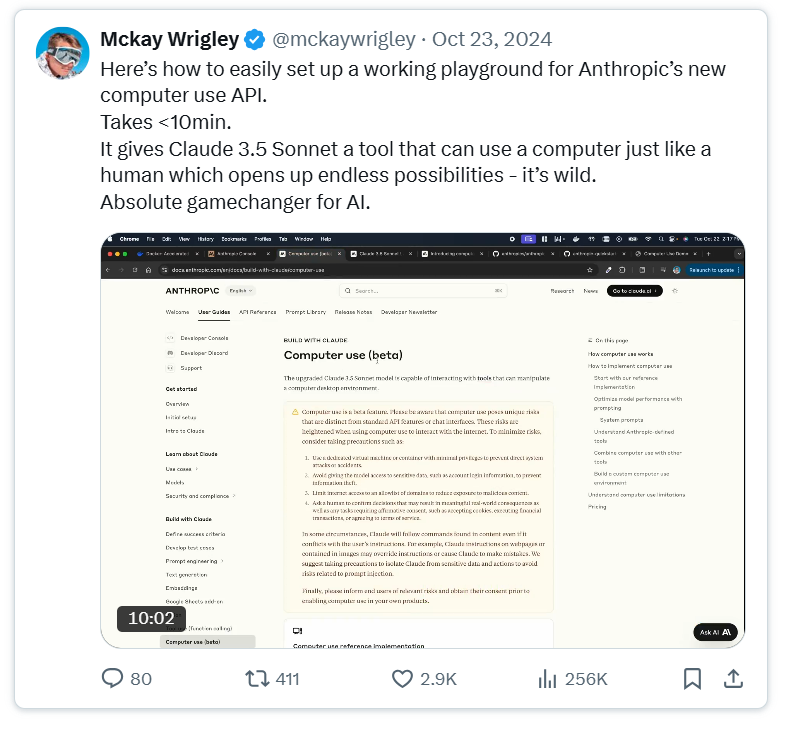
Although many crypto teams may have skipped AI chatbots and co-pilots, there is tremendous value creation opportunity here. At the same time, what is even more impressive is that the crypto field can directly tap into the realm of action-oriented intelligent agents, something that Web2 startups, even with millions or even billions in funding, find difficult to achieve.
I believe the reason crypto teams can do this is that the crypto field has established a brand new financial infrastructure. Everything is done on-chain, and executing a transaction only requires simply pushing a piece of code.
Conclusion
The most pessimistic view holds that intelligent agents are just another fleeting trend like NFTs. To this, I would say: while the hype around NFTs has decreased today, they still represent an exciting innovation in the crypto field, allowing individual tokens to possess unique attributes. Secondly, how can AI intelligent agents be compared to NFTs?
Look, with the arrival of AI, the world is undergoing transformation at an astonishing pace. Programming is becoming faster, software development is accelerating, and the transfer of knowledge is occurring in a more integrated manner. I believe that in ten years, no one may specifically talk about intelligent agents or AI, as they will be deeply integrated into all relevant software, becoming a natural part of it.
Currently, we have only just scratched the surface of AI in Web2 and Web3. Humans no longer need to spend a lot of time thinking and going through tedious processes. Today, AI can run smart contracts in the crypto field, significantly speeding up workflows and creating substantial practical value and added value for users.
Who can ignore this? This is not just a trend, but the direction of the future.
免责声明:本文章仅代表作者个人观点,不代表本平台的立场和观点。本文章仅供信息分享,不构成对任何人的任何投资建议。用户与作者之间的任何争议,与本平台无关。如网页中刊载的文章或图片涉及侵权,请提供相关的权利证明和身份证明发送邮件到support@aicoin.com,本平台相关工作人员将会进行核查。



